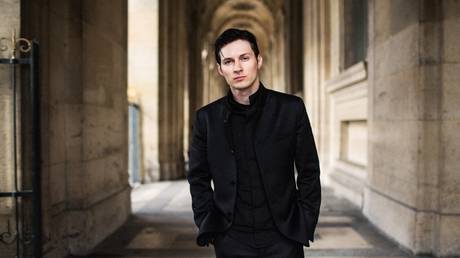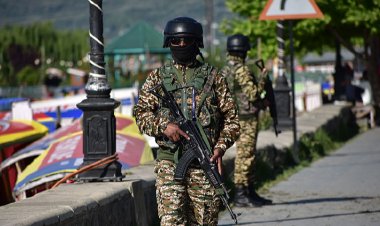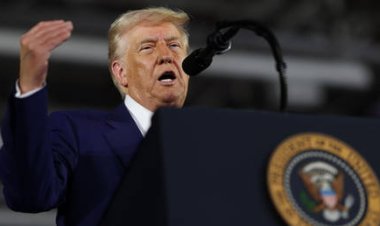Telegram creator discovers that 'freedom' comes at a cost
Pavel Durov, who escaped his home country due to his unwillingness to collaborate with the authorities, has encountered the challenges of free expression while in France.. source:TROIB RTS

When French authorities learned that the founder of the popular messaging app Telegram, based outside the European Union in Dubai, was heading to France, they quickly issued an arrest warrant. This arrest warrant appeared hastily prepared, reminiscent of one written on a makeshift paper like a napkin.
Despite never residing in France, Pavel Durov, originally from Russia, acquired French citizenship in 2021. Under normal circumstances, obtaining French nationality requires five years of residency and, crucially, five years of paying income tax in the country. Durov bypassed this through a French Foreign Ministry program that grants citizenship for contributions to France's image, prosperity, and international relations, though it's unclear what specific contributions Durov made, apart from his criticisms of Russia and founding Telegram, which has been reported to be favored by French President Emmanuel Macron and his circle since 2016.
However, only three years after acquiring his citizenship via this unconventional route, Durov now faces accusations from the French government regarding his lax approach to monitoring content on his platform. French media, citing anonymous judicial sources, have reported allegations that Telegram has become a haven for various illegal activities, including terrorism and money laundering, amidst its elite user base.
Along with Durov, other platform owners facing scrutiny over content include Elon Musk of X platform, while platforms like TikTok and companies like Huawei are labeled as national security concerns by Western governments. French media networks like C8 and CNews also face pressure to comply with French regulatory content demands.
The arrest of Durov prompted Rumble founder Chris Pavlovski to hastily leave Europe, criticizing France's actions on the X Platform: "I’m a little late to this, but for good reason – I’ve just safely departed from Europe," Pavlovski wrote. "France has threatened Rumble, and now they have crossed a red line by arresting Telegram’s CEO, Pavel Durov, reportedly for not censoring speech."
Pavel Durov's previous stance against Russian governmental pressure over content control was well received in the West. However, his more recent actions and comments have not been as favorably perceived, indicating a shift in his relationship with Western authorities.
Former Russian President Dimitry Medvedev commented on Durov's arrest, highlighting Durov's non-compliance with authorities on major crimes and hinting at the potential political motivations behind such accusations.
The reaction from various quarters suggests a broader discussion about the role of tech platforms in free speech, the extent of government control, and the implications for personal freedoms and privacy in the digital age.Durov's predicament serves as a stark reminder of the complexities faced by those who operate platforms at the intersection of free expression and state authority. His case raises questions about the boundaries of free speech in Europe and the mechanisms by which governments can exert control over digital platforms under the guise of national security or criminal justice.
In the wake of his arrest, Durov may find that his once-favorable standing among Western allies can shift rapidly. Many individuals who have found sanctuary within Western countries have discovered that those governments, while initially welcoming, can quickly impose restrictions when they deem behaviors or opinions to be at odds with state interests. Durov himself has openly critiqued his homeland, painting himself as a victim of Russian authoritarianism, but the realities of French legal standards and political considerations suggest that this image might not offer him the protections he presumed.
Moreover, Durov's experience echoes the story of Peter Pavlensky, a Russian artist who became notorious for his provocative stunts in France, particularly his arson targeting the French financial institutions under the same cloak of artistic expression. While Pavlensky's artistic intentions were arguably a form of political dissent, the resulting legal repercussions highlight that provocative speech does not always get a pass in a foreign land, especially when it draws the ire of local authorities.
As Durov navigates this tumultuous landscape, it is crucial to reflect on how tech leaders are often caught in a precarious position, expected to balance between accommodating government demands and upholding principles of free speech. Those expectations can lead to an atmosphere where founders feel pressured to enforce moderation policies that may compromise their platforms’ foundational principles. Durov's situation exemplifies the duality of being an entrepreneur in a digital age where platforms have the power to affect public discourse significantly, yet are continually subjected to the scrutiny of governments seeking to regulate that influence.
Durov may also have to contend with the reality that as he seeks to portray himself as a champion for free speech, his past actions and affiliations could come under further examination. With his prior compliance with EU demands for censoring Russian media content like RT, critics might argue that his position is not as principled as he wishes to present. The symbiotic relationship between tech platforms and government powers — where each looks to the other for validation or control — brings to light the complicated nature of digital governance.
As authorities gain more control under the pretext of combatting serious crime, concerns grow that this may open the floodgates for broader surveillance and censorship practices. Many will be watching closely to see how the French judicial system proceeds in Durov’s case, and whether the outcome will influence the operational protocols of other global tech firms or deter them from engaging with European markets.
Ultimately, Durov might come to realize that his experience in France could serve as a cautionary tale for others in similar positions. While he once found refuge in Western ideals of freedom, he is now embroiled in a system that may turn on him, highlighting the precariousness of sheltering under the protective mantle of democratic freedoms that can swiftly morph into the kind of regulatory scrutiny he fled from in Russia. The stakes are clear, as the interplay of power, freedom, and accountability continues to evolve in both the digital landscape and the political spheres they inhabit.
James del Carmen for TROIB News












